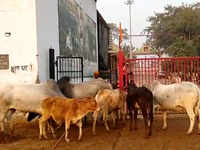Plastic demon threatens sanctity of Vanabadrakali Amman Temple
Rajasekaran RK | tnn | Jan 21, 2019, 00:13 ISTCoimbatore: Decades ago, devotees used to take a dip in the nearby Bhavani river before offering prayer in the Vanabadrakali Amman Temple at Thekkampatti near Mettupalayam. They now hesitate to even visit the riverbank, littered with trash, including plastic. Discarded carry bags and clothes float on the once pristine river.
“Due to pollution, devotees hesitate to even wash their legs in the river. Those who tonsure their heads as part of vow, find the water too dirty to take bath,” said K Ravichandran, a devotee.
Spread over 15 acres on the banks of Bhavani, the temple was one of the main pilgrimage destinations in the western Tamil Nadu. Bathing in the river before entering the temple was a part of the ritual. All that changed after a check dam was constructed at Samayapuram, one-and-a-half-kilometre from the temple, which resulted in stagnation of water.
Now, poor implementation of the plastic ban has made the situation worse at the Hindu religious and charitable endowment (HR&CE) department-run temple. Piles of discarded plastic products adorn the temple premises. The temple administration has failed to set up a proper waste disposal system. There is not even a single dustbin on the temple premises.
The official apathy is evident as even prasadam is wrapped in single use plastic. Shops including food stalls near the temple continue to use plastic. Devotees, who discard clothes and other belongings in the water body as a ritualistic practice, are also to be blamed. Besides floating betel leaves with burning camphor in the river, they drop the belongings, including plastic bags. Though the temple does not act as a place for performing such rituals as at Kooduthurai, a holy place situated in the Erode district, the belief grew over the years.
“As the padithurai (bathing ghat) was getting polluted, the department appointed a coracle operator to remove clothes and plastic from the river,” an HR & CE official said.
However, trash containing plastic is burnt on the riverbank, causing air pollution. HR&CE department is taking steps to implement the plastic ban and improve the waste disposal system, assistant commissioner K Ramu said. “But it is not easy to ensure cleanliness in the village-bound temple mainly because of lack of awareness among the devotees about plastic pollution. People keep on throwing their belongings in the river. We have proposed to construct a concrete-lined pond inside the river at cost of Rs 47lakh so that the devotees could take dip safely. We will also streamline the waste disposal system,” he told TOI.
“Due to pollution, devotees hesitate to even wash their legs in the river. Those who tonsure their heads as part of vow, find the water too dirty to take bath,” said K Ravichandran, a devotee.
Spread over 15 acres on the banks of Bhavani, the temple was one of the main pilgrimage destinations in the western Tamil Nadu. Bathing in the river before entering the temple was a part of the ritual. All that changed after a check dam was constructed at Samayapuram, one-and-a-half-kilometre from the temple, which resulted in stagnation of water.
Now, poor implementation of the plastic ban has made the situation worse at the Hindu religious and charitable endowment (HR&CE) department-run temple. Piles of discarded plastic products adorn the temple premises. The temple administration has failed to set up a proper waste disposal system. There is not even a single dustbin on the temple premises.
The official apathy is evident as even prasadam is wrapped in single use plastic. Shops including food stalls near the temple continue to use plastic. Devotees, who discard clothes and other belongings in the water body as a ritualistic practice, are also to be blamed. Besides floating betel leaves with burning camphor in the river, they drop the belongings, including plastic bags. Though the temple does not act as a place for performing such rituals as at Kooduthurai, a holy place situated in the Erode district, the belief grew over the years.
“As the padithurai (bathing ghat) was getting polluted, the department appointed a coracle operator to remove clothes and plastic from the river,” an HR & CE official said.
However, trash containing plastic is burnt on the riverbank, causing air pollution. HR&CE department is taking steps to implement the plastic ban and improve the waste disposal system, assistant commissioner K Ramu said. “But it is not easy to ensure cleanliness in the village-bound temple mainly because of lack of awareness among the devotees about plastic pollution. People keep on throwing their belongings in the river. We have proposed to construct a concrete-lined pond inside the river at cost of Rs 47lakh so that the devotees could take dip safely. We will also streamline the waste disposal system,” he told TOI.

































All Comments ()+^ Back to Top
Refrain from posting comments that are obscene, defamatory or inflammatory, and do not indulge in personal attacks, name calling or inciting hatred against any community. Help us delete comments that do not follow these guidelines by marking them offensive. Let's work together to keep the conversation civil.
HIDE